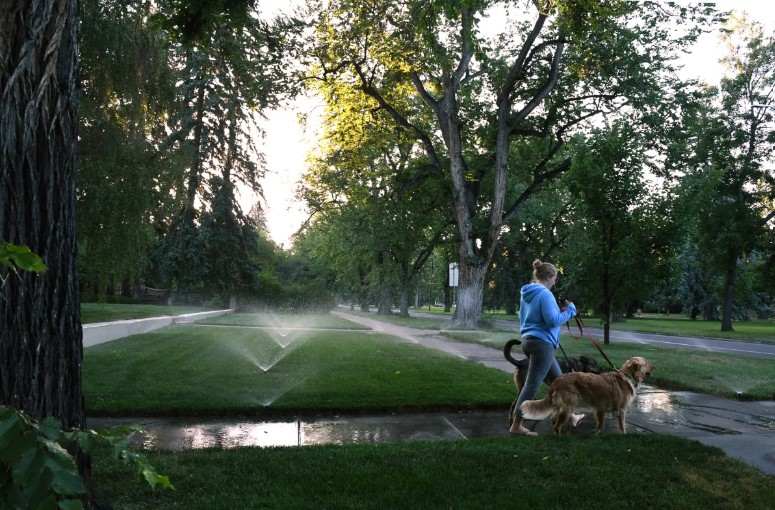Denver-area homeowners and businesses, in their race to start their automatic sprinklers at 5 a.m. on Monday mornings, are putting unprecedented stress on Denver Water’s delivery system, threatening its supply of locally stored, treated water.
Roughly 80% of the utility’s 1.5 million customers have watering systems that can be set and then left for the season, but too many are going off at 5 a.m. at the start of the week, a period that has become the witching hour for Colorado’s largest water utility.
In response, it is asking, nicely, that more people shift from the Monday, Wednesday and Friday summer watering schedule, and use the Tuesday, Thursday and Saturday slots instead.
Greg Fisher, manager of demand planning and efficiency, said the trend has been emerging for several years, as climate change drives summer temperatures higher and automated watering systems have become the norm.
“Our pretty educated guess is that when people buy a new irrigation controller the default is Monday, Wednesday and Friday from 5 a.m. to 6 a.m, and that is when we see our max hours,” Fisher said.
Water use has become so high at that time that it threatens Denver’s supply of locally stored, treated water. If it isn’t changed, Fisher said, it could mean the utility will have to upgrade its delivery system and increase the amount of treated water it keeps stored for daily use.
In Thornton, the surge in Monday morning water use by its 165,000 customers is also a concern, said Emily Hunt, the fast-growing city’s water resources manager.
“We definitely notice the really heavy peaks,” Hunt said. “Our system can handle it right now, but we have to keep an eye on it because your plants and your pumps are working that much harder. It can be really challenging.”
And it’s not likely to change anytime soon, as Colorado’s summers see increasingly hot temperatures.
“Climate models unanimously show our summers are getting hotter, and along with warmer temperatures we are seeing moisture in the soil and under landscapes is being pulled out more quickly,” said Peter Goble, a climatologist with the Colorado Climate Center at Colorado State University.
“With that, it stands to reason that irrigation demand would increase if you’re trying to keep the same amount of acres green as before,” he said.
Castle Rock has some of the strictest lawn watering rules in the state, and that partly explains why it has been able to manage the new peaks in demand, said Mark Marlowe, director of Castle Rock Water.
For instance, the city only allows its homeowners to water every third day. Businesses are allowed to water three days a week.
“The whole reason Castle Rock developed watering days originally was because our infrastructure was not big enough to allow everyone to water on the same day,” he said. “To be fair, if we had everyone water on the same day we would have the same problem as Denver.”
Across the state in Grand Junction, despite record-breaking heat this summer, the Ute Water Conservancy District has been largely stress free when it comes to peak water demand. It is the area’s largest water utility and serves about 80,000 customers.
“We’ve seen some increased temperatures,” said Larry Cleaver, the utility’s manager. That’s because unlike many newer water systems, Ute forces its customers to use untreated water from old irrigation canals to soak their lawns so that it doesn’t have to treat and deliver drinking water to homes. Residential developments are built with this two-pipe system.
“But generally we’re doing fine,” he said.
As summer slides into fall, more hot weather is in the forecast, according to Goble, and that’s not encouraging water managers.
Denver Water’s Fisher said climate change will continue to create weather extremes and challenge communities’ ability to manage their water supplies during hot summers.
He’s hoping a large number of Denver customers will reset their watering systems and embrace the Tuesday, Thursday, Saturday schedules so the utility doesn’t have to spend millions of dollars upgrading its pipes and expanding treated water storage.
“The great news is that for us to avoid those infrastructure costs, this is an easy fix,” he said.



 Print
Print